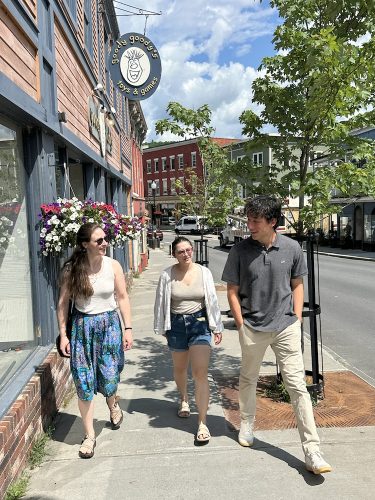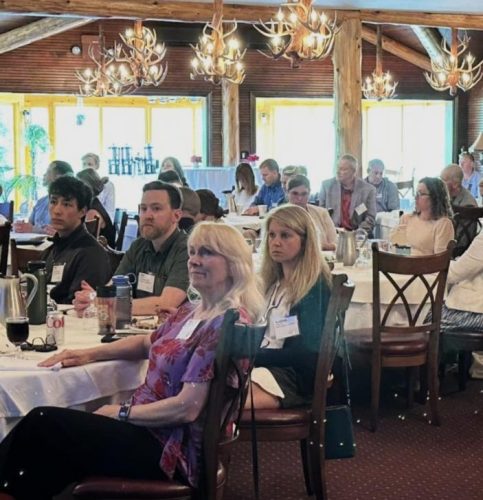by Alec Lehtman, ANCA Summer Research Fellow
This summer, I had the pleasure of working with ANCA as a small business research fellow, as a part of Colgate University’s Upstate Institute Summer Field School. The Field School matches students with community organizations across the Adirondack region to support community based research and cultivate local partnerships. As someone studying in New York who had not otherwise spent significant time in the North Country, this fellowship offered both professional and personal growth opportunities, allowing me to gain first-hand exposure to the region’s people, places, and culture while conducting research to better understand and support the small business ecosystem.
cultivate local partnerships. As someone studying in New York who had not otherwise spent significant time in the North Country, this fellowship offered both professional and personal growth opportunities, allowing me to gain first-hand exposure to the region’s people, places, and culture while conducting research to better understand and support the small business ecosystem.
Early in the fellowship, I was given the primary task of building the foundation for a regional economic analysis to support ANCA’s small business work by collecting economic and workforce data. This meant rolling up my sleeves and diving into the American Community Survey and American Business Survey to extract county-level information on business owner demographics, business structures, and regional economic trends. Overall, my goal was to identify patterns, gaps, and opportunities in the data that could help ANCA better support small business development across its 14-county region. While the data work was complex and at times difficult, it was fulfilling to see how it reflected the realities of the economy on the ground.
To balance my time spent in spreadsheets, I also had ample time to familiarize myself with the greater region. I attended the North Country Chamber of Commerce Business Expo, which introduced me to the unique entrepreneurial spirit of the region. A later visit to Camp Dudley, a sleepaway camp with a long history in the Westport area, taught me about the unique institutions and history of the area. I also enjoyed attending the Adirondack Land Trust Porch Social, where I met other interns and fellows from community organizations also spending their summers in the North Country. Of course, no summer in the Adirondacks is complete without spending time in the great outdoors, and I spent time camping at Fish Creek Campground and climbing as many High Peaks as I possibly could.
Beyond these moments in the community, I was able to sit in on much of ANCA’s ongoing small business work. From a Go-SEMI planning meeting, focused on the impact of New York State’s recent semiconductor investment on local small businesses, to a St. Regis Mohawk Tribe Economic Development meeting, I witnessed ANCA’s unique role in working towards an inclusive and prosperous economic environment in the greater region.
In parallel, I worked closely with ANCA’s Small Business team, contributing data presentations and creating materials to assist ANCA’s mission in

Photo courtesy of North Country Alliance
supporting rural small businesses. One such presentation occurred through the Center For Businesses in Transition (CBIT), an ANCA initiative focused on helping retiring business owners pass on their businesses instead of shutting their doors. By highlighting the extent to which the succession gap occurs in the North Country, I was able to emphasize the importance of the work CBIT is conducting. I also spent time with ANCA’s Food Systems team, learning about how economic development intersects with agriculture and food security.
However, perhaps the most enriching aspect of my work was the data sharing with nonprofit leaders that occurred at the end of my six-week experience.
I conducted interviews and conversations with distinct local partners to further understand how the numbers I had discovered matched the on-the-ground reality. These conversations with community partners such as the North Country Small Business Development Center and the Mohawk Valley Economic Development District brought my research project to life and gave immense meaning to the data I had collected.
In total, I led eight meetings with community-based partners, each helping me test my assumptions about the regional economy, refine the framing of my research project, and provide human testament to my data.
This fellowship taught me that data and numbers alone mean very little without an understanding of the region and the people behind the numbers. In the North Country, with its fascinating history and tightly-knit communities, building relationships and having a sense of place and history is essential. I’m extremely grateful to ANCA and all the community partners who generously shared their time, insights, and perspectives with me. Through this experience, I’ve gained a stronger understanding of the challenges facing rural economies, small business dynamics, and the importance of community-based solutions. Most of all, I leave this fellowship with a real appreciation for the North Country and a desire to stay connected to the crucial work being done here.
